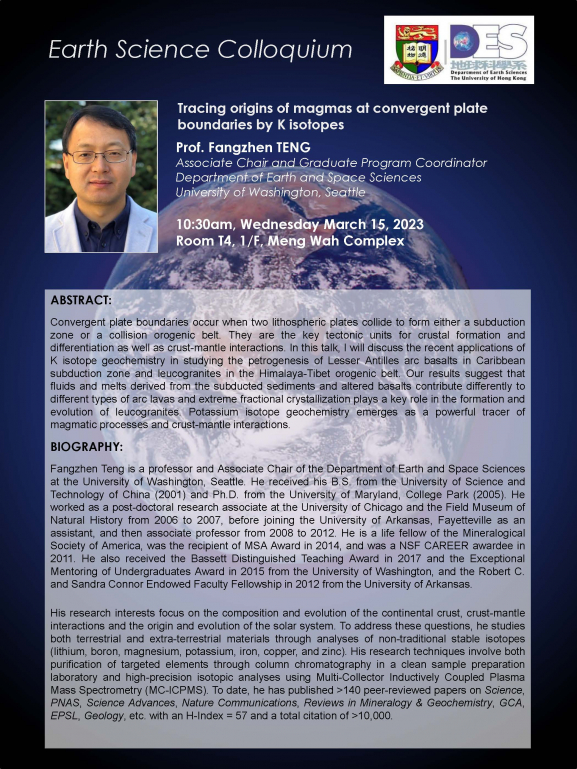 HKU Department of Earth Science
HKU Department of Earth Science
Seminar

Tracing origins of magmas at convergent plate boundaries by K isotopes
-
Date
March 15,2023
-
Time
10:30AM
-
Venue
Meng Wah Complex T4
-
Speaker
Prof. FangzhenTENG Associate Chair and Graduate Program Coordinator Department of Earth and Space Sciences University of Washington, Seattle
Abstract:
Convergent plate boundaries occur when two lithospheric plates collide to form either a subduction zone or a collision orogenic belt. They are the key tectonic units for crustal formation and differentiation as well as crust-mantle interactions. In this talk, I will discuss the recent applications of K isotope geochemistry in studying the petrogenesis of Lesser Antilles arc basalts in Caribbean subduction zone and leucogranites in the Himalaya-Tibet orogenic belt. Our results suggest that fluids and melts derived from the subducted sediments and altered basalts contribute differently to different types of arc lavas and extreme fractional crystallization plays a key role in the formation and evolution of leucogranites. Potassium isotope geochemistry emerges as a powerful tracer of magmatic processes and crust-mantle interactions.
Biography:
Fangzhen Teng is a professor and Associate Chair of the Department of Earth and Space Sciences at the University of Washington, Seattle. He received his B.S. from the University of Science and Technology of China (2001) and Ph.D. from the University of Maryland, College Park (2005). He worked as a post-doctoral research associate at the University of Chicago and the Field Museum of Natural History from 2006 to 2007, before joining the University of Arkansas, Fayetteville as an assistant, and then associate professor from 2008 to 2012. He is a life fellow of the Mineralogical Society of America, was the recipient of MSA Award in 2014, and was a NSF CAREER awardee in 2011. He also received the Bassett Distinguished Teaching Award in 2017 and the Exceptional Mentoring of Undergraduates Award in 2015 from the University of Washington, and the Robert C. and Sandra Connor Endowed Faculty Fellowship in 2012 from the University of Arkansas.
His research interests focus on the composition and evolution of the continental crust, crust-mantle interactions and the origin and evolution of the solar system. To address these questions, he studies both terrestrial and extra-terrestrial materials through analyses of non-traditional stable isotopes (lithium, boron, magnesium, potassium, iron, copper, and zinc). His research techniques involve both purification of targeted elements through column chromatography in a clean sample preparation laboratory and high-precision isotopic analyses using Multi-Collector Inductively Coupled Plasma Mass Spectrometry (MC-ICPMS). To date, he has published >140 peer-reviewed papers on Science, PNAS, Science Advances, Nature Communications, Reviews in Mineralogy & Geochemistry, GCA, EPSL, Geology, etc. with an H-Index = 57 and a total citation of >10,000.
